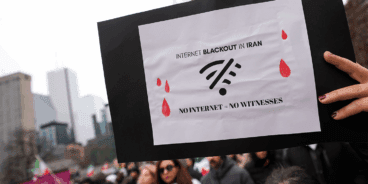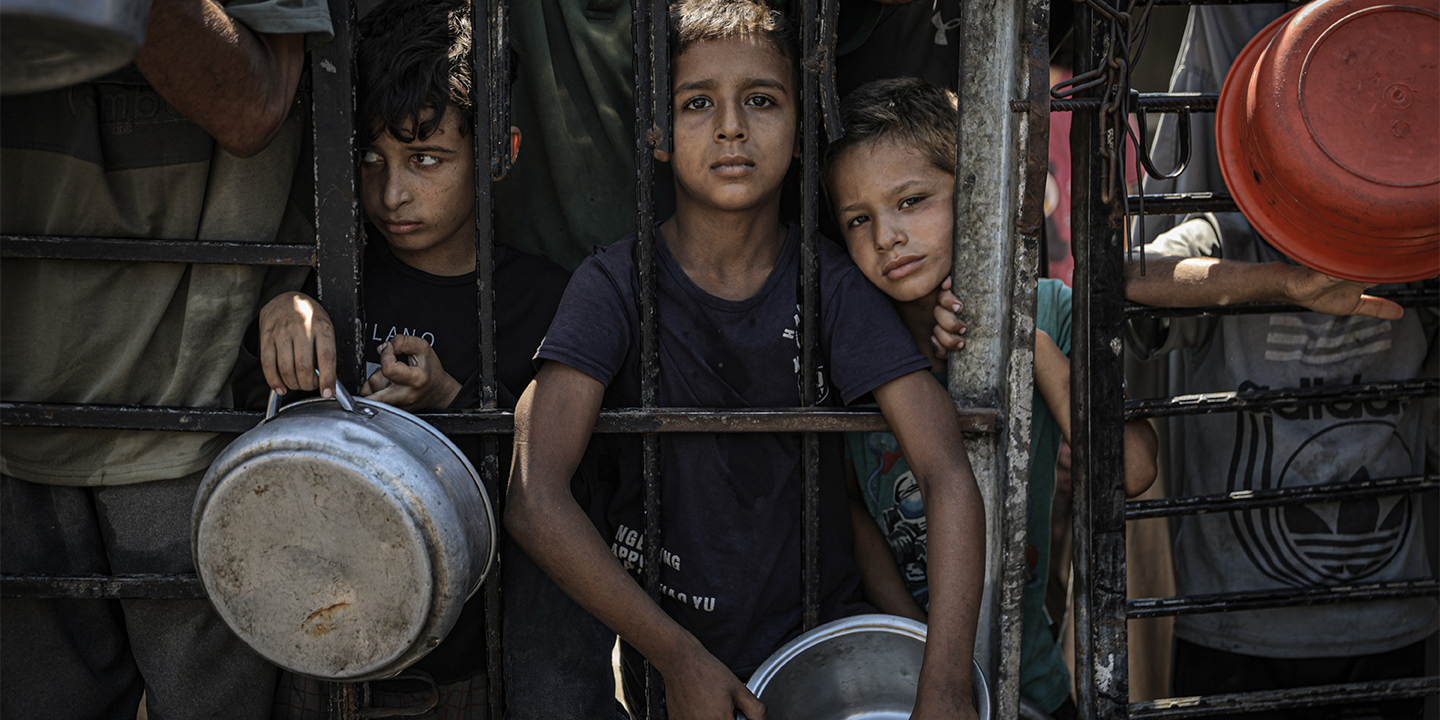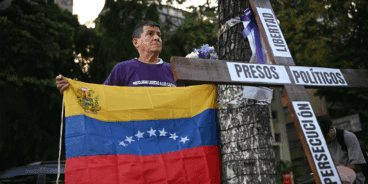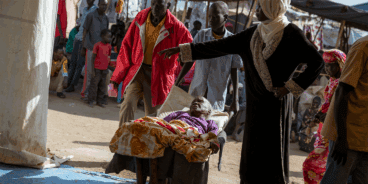

Atrocity Alert No. 448: Israel and the Occupied Palestinian Territory, Sudan and China
Atrocity Alert is a weekly publication by the Global Centre for the Responsibility to Protect highlighting situations where populations are at risk of, or are enduring, mass atrocity crimes.
CALLS TO HALT GENOCIDE IN GAZA MOUNT AS ISRAELI-MADE FAMINE SPREADS
On 22 August the Integrated Food Security Phase Classification (IPC) officially declared famine in the Gaza Governorate, with projections that it will expand to Deir al-Balah and Khan Younis by the end of September. The declaration follows months of warnings from Palestinian organizations that famine had already reached an “advanced stage” in Gaza. In July alone, the World Health Organization recorded at least 63 malnutrition-related deaths, including 24 children under the age of five, after previously warning that Gaza’s population is “trapped in a dangerous cycle where malnutrition and disease fuel each other, turning everyday illness into a potential death sentence.”
UN Secretary-General António Guterres described this first official famine declaration in the Middle East as a “man-made disaster, a moral indictment – and a failure of humanity itself,” condemning Israel’s “deliberate collapse of the systems needed for survival” in Gaza. With the long-term impacts of famine already setting in, Palestinians continue to face lethal risks while attempting to access food from militarized distribution hubs operated by the Israel- and United States-backed “Gaza Humanitarian Foundation.”
Meanwhile, Israel has begun mobilizing tens of thousands of reservists in preparation for a new military offensive in Gaza, including plans to seize control of Gaza City. Despite widespread condemnation of Israel’s plans to further entrench its illegal occupation, the absence of tangible international response measures has prompted growing pressure on states to act decisively. Following a mid-August visit to the Rafah border by members of The Elders, Mary Robinson stressed, “Governments that are not using all the tools at their disposal to halt the unfolding genocide in Gaza are increasingly complicit. Political leaders have the power and the legal obligation to apply measures to pressure the Israeli government to end its atrocity crimes.”
On the same day as the IPC famine declaration, the Gaza Tribunal – a people’s tribunal of Palestinian and international experts – issued an emergency statement calling for the implementation of the Responsibility to Protect and urging the UN General Assembly to establish an international protection force under the “Uniting for Peace” resolution. On 1 September the International Association of Genocide Scholars, representing some 500 members, overwhelmingly adopted a resolution determining that Israel’s conduct in Gaza meets the legal definition of genocide under the Genocide Convention and called for immediate international action.
Piecemeal efforts, inaction and complicity by many influential states have accelerated Israel’s genocide in Gaza and undermined the protection of vulnerable populations elsewhere. The obligation to prevent genocide is not discretionary, and all states must act swiftly to impose comprehensive arms embargoes, sanction Israeli officials and suspend trade deals. The international community must uphold their collective Responsibility to Protect and utilize all available tools to halt ongoing atrocities in the Occupied Palestinian Territory, including by supporting the establishment of an international protection force, with a mandate determined by the Palestinian people.
CIVILIANS KILLED IN INTENSIFYING CONFLICT IN EL FASHER AND ABU SHOUK, NORTH DARFUR
During August, hostilities in and around Sudan’s El Fasher, North Darfur, escalated sharply, with civilians enduring intensified shelling, bombardments and deepening insecurity. The city has suffered the most violent air and ground attacks to date. Since 11 August, the paramilitary Rapid Support Forces (RSF) have perpetrated assaults on El Fasher and the nearby Abu Shouk displacement camp, killing at least 125 civilians, some through summary executions. The UN warns that the actual death toll is likely higher. On 28 August heavy artillery strikes on the central market and densely populated areas of the Awlad al-Reef neighborhood killed at least 24 people and wounded 55 more, including women and children.
For over 500 days, the RSF have been consolidating control around El Fasher, cutting off crucial supply routes, attacking displacement sites like Zamzam and Abu Shouk and destroying critical infrastructure. Civilians are effectively trapped under siege as exit routes have been blocked. The latest report from the Yale School of Public Health’s Humanitarian Research Lab suggests the construction of 31 km of a perimeter wall to restrict movement and trap people inside. These deliberate actions raise the risk of further genocide against non-Arab communities. On 29 August UN Secretary-General António Guterres expressed alarm over the relentless RSF attacks, warning of “the grave risks of serious violations of international humanitarian law as well as violations and abuses of international human rights law, including ethnically motivated ones.”
The ongoing siege and hostilities in North Darfur have left hundreds of thousands of civilians without adequate food, water or medical care. Though critical supplies are pre-positioned nearby, efforts to deliver them into El Fasher continue to face obstacles. According to the UN Children’s Fund, at least 600,000 people – half of them children – have been displaced from El Fasher and surrounding camps. The city has become an “epicentre of child suffering, with malnutrition, disease, and violence claiming young lives daily.” In one week alone during August, over 60 people, mostly women and children, died of malnutrition, and the risk of famine is growing across El Fasher and North Darfur.
The international community must demand that all parties to the conflict immediately cease attacks on civilians and civilian infrastructure, fully comply with international humanitarian and human rights law and prioritize the protection of civilians, especially children, women and other vulnerable populations. Unhindered humanitarian access to El Fasher, Zamzam, Abu Shouk and other affected areas is essential to deliver food, medical care and life-saving assistance to those trapped under siege.
SCRUTINY OF CHINA’S CRIMES AGAINST HUMANITY TARGETING UYGHURS REMAINS ESSENTIAL
Sunday, 31 August, marked three years since the landmark report by the Office of the UN High Commissioner for Human Rights (OHCHR) concluded that the Chinese government may be perpetrating crimes against humanity against Uyghurs and other predominantly Muslim groups. The report criticized China’s “deeply problematic” so-called counterterrorism system, which enables widespread arbitrary detention, and remains the most definitive and detailed UN document on rights abuses in the Xinjiang Uyghur Autonomous Region.
Since 2022 the Chinese government has demonstrated little change in its Uyghur Region policies. Last year’s OHCHR update warned that “many problematic laws and policies remain,” including national security and counterterrorism frameworks that facilitate ongoing abuses. China’s policies continue to draw consistent concern from UN Special Procedures, treaty bodies and independent experts, who have documented widespread and systematic abuses, including mass arbitrary detention, forced labor and cultural erasure. Notably, the Committee on the Elimination of Racial Discrimination referred the situation to the UN Office on Genocide Prevention and the Responsibility to Protect. Following OHCHR’s 2022 report, a growing number of governments have raised concerns during successive cycles of China’s Universal Periodic Review and imposed targeted or other sanctions.
However, coordinated multilateral action to advance accountability has steadily declined. Joint statements on China at the UN Human Rights Council (HRC) dropped from 22 in June 2023 to only eight in June 2025. This erosion of international scrutiny sends a dangerous signal of acquiescence, undermining the credibility of the international human rights system.
At the European Union (EU)-China Summit from 24-25 July, economic issues dominated the discussions amid what European Commission President Ursula von der Leyen called the new “China shock.” Yet, economic dialogue cannot be separated from human rights. Forced labor, particularly affecting those from the Uyghur Region, remains integral to China’s export-driven economy, implicating global supply chains from agriculture to technology. While the EU’s new Forced Labor Regulation is a significant step forward, the summit’s minimal focus on rights suggests a troubling willingness to sideline human rights in favor of trade.
Member states, regional bodies and the private sector must act decisively to uphold human rights as a non-negotiable element of engagement with China. Julia Saltzman, China expert at the Global Centre for the Responsibility to Protect, stressed, “Governments and OHCHR should seize the report anniversary and the upcoming 60th session of the HRC to press for real change in the Uyghur Region. China must develop and implement a clear roadmap with timelines to act on the recommendations of OHCHR and other UN human rights bodies and mechanisms. This includes ending legal and policy practices that enable forced transfers and exploit enforcement gaps in global supply chains.”
Related Content


Atrocity Alert No. 464: Venezuela, Sudan and Nigeria
